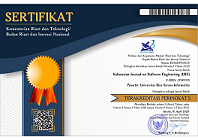Kajian Efektifitas Jakarta Smart City (Study Deskriptif Menilai Persepsi Kemudahan dan Persepsi Kegunaan Jakarta Smart City Oleh Masyarakat DKI Jakarta khususnya Jakarta Selatan)
Abstract
ABSTRACT - Jakarta Smart City is an application owned by Jakarta Provincial Government to provide information society Jakarta conditions through application partners who cooperate with Jakarta Provincial Government. The purpose of this study was to determine and assess Jakarta Smart City system used by citizens to assist in the service to the community seen from the perception of convenience and usability. The method used is the method of TAM (Technology Acceptance Model) with the help of AMOS software.. Results obtained Factors that affect the acceptance of the use of the system by the citizens of Jakarta Smart City capabilities include yourself on the computer, perceived ease of use, perceived usefulness, attitude to use , behavioral intention to use, and actual use of the system. So Jakarta Smart City system can improve the complaints process and community service.
Keywords: Jakarta Smart City system, technology acceptance model, AMOS
ABSTRAK - Jakarta Smart City adalah aplikasi yang dimiliki oleh Pemerintah Provinsi DKI Jakarta untuk memberikan masyarakat informasi kondisi Jakarta melalui mitra aplikasi yang bekerjasama dengan Pemerintah Provinsi DKI Jakarta. Tujuan dari penelitian ini adalah untuk mengetahui dan menilai system Jakarta Smart City yang digunakan oleh warga untuk membantu proses pelayanan kepada masyarakat dilihat dari persepsi kemudahan dan kegunaan. Metode yang digunakan adalah dengan metode TAM (Technology Acceptance Model) dengan bantuan software AMOS.. Hasil yang diperoleh Faktor-faktor yang mempengaruhi penerimaan penggunaan system Jakarta Smart City oleh warga meliputi kemampuan diri pada komputer, persepsi kemudahan penggunaan, persepsi kemanfaatan, Sikap untuk menggunakan, perilaku niat untuk menggunakan, dan penggunaan nyata sistem. Jadi system Jakarta Smart City dapat meningkatkan proses pengaduan dan pelayanan masyarakat.
Keywords: Jakarta Smart City system, technology acceptance model, AMOS
Full Text:
PDFReferences
Allwinkle, Sam & Cruickshank, Peter (2011). Creating Smart-er Cities: An Overview. Journal of Urban Technology, Vol. 18, No. 2, April 2011, 1–16. Routledge.
Ghozali, Imam. (2008). Model Persamaan Structural Konsep & Aplikasi dengan Program AMOS 16. Semarang: Badan Penerbit-UNDIP.
Hair et al. (2006). Multivariate Data Analysis Fifth Edition. New Jersey: Pearson Education International.
Hwang, Y. and Yi, M. Y. (2002). Predicting The Use Of Web-Based Information Systems: Intrinsic Motivation And Self-Efficacy, Eighth Americas Conference on Information Systems. University of South Carolina.
Marc, Weng Lim dan Hooi, Ding Ting. (2012). E-shopping: an Analysis of the Technology Acceptance Model. Modern Applied Science, Vol. 6, No. 4; April.
Monisa, Martina. (2013). Persepsi Kemudahan Dan Kegunaan Opac Perpustakaan Unair. Jurnal UNAIR Vol. 2 No. 1.
Nam, Taewoo; & Pardo, Theresa A. (2011). “Conceptualizing Smart City with Dimensions of Technology, People, and Institutions”, The Proceedings of
the 12th Annual International Conference on Digital Government Research.
Rakhmad, et. al. (2013). Pengaruh Persepsi Kemudahan dan Persepsi Kemanfaatan Terhadap Penggunaan Youtube Dengan Pendekatan TAM. Jurnal Ilmu Administrasi Vol 3 No 1.
Santoso, Budi. (2012). Pengaruh Perceived Usefulness, Perceived Ease Of Use, Dan Perceived Enjoyment Terhadap Penerimaan Teknologi Informasi. Jurnal Studi Akuntansi Indonesia Vol 1 No 1.
Subyantoro, Arif. (2008). Computer Self Efficacy Dalam Upaya Meningkatkan SDM Koperasi Dengan Pendekatan Sosialisasi Gender. JAMBSP Vol. 4 No. 3 : 291 – 305.
Swedberg, Karl, and Jonathan Chaffer. 2010. jQuery 1.4 Reference Guide. Packt Publishing Ltd., UK.
Vito Albino., dkk. 2015. Smart Cities: Definitions, Dimensions, Performance, and Initiatives,
Widodo, Prabowo, P. (2006). Technology Acceptance Model (TAM). Jakarta.
Yeni, Hasan, dan Tarmansyah. (2013). Efektifitas Sistem Jakarta Smart City Untuk Meningkatkan Kemampuan Penjumlahan Bagi Anak Kesulitan Belajar Di Min Koto Luar, Kecamatan Pauh. Jurnal Ilmiah Pendidikan Khusus Volume 2, nomor 3, September 2013
www.Jakarta Smart City.com
DOI: https://doi.org/10.31294/ijse.v3i1.2605
ISSN : 2714-9935


Published by LPPM Universitas Bina Sarana Informatika
Jl. Kramat Raya No.98, Kwitang, Kec. Senen, Kota Jakarta Pusat, DKI Jakarta 10450
This work is licensed under a Creative Commons Attribution-ShareAlike 4.0 International License









